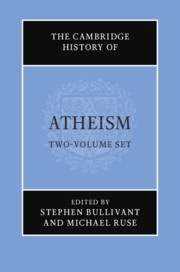Book contents
- The Cambridge History of Atheism
- The Cambridge History of Atheism
- Copyright page
- Dedication
- Contents
- Acknowledgments
- Contributors
- Introduction
- Part I Preliminaries
- Part II Atheisms in History
- 4 Pre-modern Japan
- 5 Ancient Greece
- 6 The Roman Empire
- 7 India: 1500 BC to AD 1200
- 8 Christian Europe
- 9 The Islamic World
- Part III Reformation, Renaissance, Enlightenment
- Part IV Classical Modernity: Philosophical and Scientific Currents
- Part V Classical Modernity: Social and Political Currents
- Part VI Twentieth and Twenty-First Centuries: Intellectual and Artistic Currents
- Part VII Lived Atheism in the Twentieth- and Twenty-First Centuries: Case-Studies
- Part VIII Emerging Atheisms in the Twenty-First Century
- Part IX Conclusion
- Index
- References
5 - Ancient Greece
from Part II - Atheisms in History
Published online by Cambridge University Press: 25 September 2021
- The Cambridge History of Atheism
- The Cambridge History of Atheism
- Copyright page
- Dedication
- Contents
- Acknowledgments
- Contributors
- Introduction
- Part I Preliminaries
- Part II Atheisms in History
- 4 Pre-modern Japan
- 5 Ancient Greece
- 6 The Roman Empire
- 7 India: 1500 BC to AD 1200
- 8 Christian Europe
- 9 The Islamic World
- Part III Reformation, Renaissance, Enlightenment
- Part IV Classical Modernity: Philosophical and Scientific Currents
- Part V Classical Modernity: Social and Political Currents
- Part VI Twentieth and Twenty-First Centuries: Intellectual and Artistic Currents
- Part VII Lived Atheism in the Twentieth- and Twenty-First Centuries: Case-Studies
- Part VIII Emerging Atheisms in the Twenty-First Century
- Part IX Conclusion
- Index
- References
Summary
The modern word ‘atheist’ derives from ancient Greek – theos means ‘god’, and the prefix a- denotes absence. The word atheos is first encountered in poetic texts of the fifth century BC, where it means something like ‘god-forsaken’ or ‘impious’, and is used of those who are thought to be uncivilized or in some other way beyond the pale. For example, in Aeschylus’ earliest surviving play, Persians (472 BC), the defeat of Xerxes’ army is said to be requital for ‘their outrageous actions and godless (atheos) arrogance’ (808). In later Greek literature, however, particularly in prose texts, the word took on an additional meaning close to the modern one – that is, ‘lacking in belief in the gods’.
- Type
- Chapter
- Information
- The Cambridge History of Atheism , pp. 84 - 99Publisher: Cambridge University PressPrint publication year: 2021



